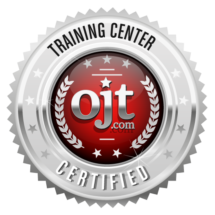
INDUSTRY-LEADING LIVE
INSTRUCTOR-LED TRAINING
World Class Training Content, Delivered On-Demand
BRIDGING THE GAP
between career seekers
& employers
from COAST-TO-COAST

World Class Training Content, Delivered On-Demand
between career seekers
& employers
from COAST-TO-COAST
Equipment Operators
QUALIFICATIONS
A certificate, high school or General Educational Development (GED) carpentry trade journeypersons‘ diploma, with or without an Associate Degree, requisite study and practice credit hours and Commercial Heavy Equipment Driving License from an authorized body like the Department of Transportation (DOT), National Commission for the Certification of Crane Operators (NCCCO), etc.; combined with instruction based – On the Job Training (OJT) programs, Apprenticeships, Heavy Equipment Operator Workforce Job Training or Experience; covering heavy equipment operations work topics including reading blueprints, calculating height, weight and volume, evaluating soil conditions, preparing construction sites, excavation and trenching, good knowledge, usage, and operation of heavy equipment like cranes, bulldozers, forklifts, backhoes, graders, dump trucks and pavers, besides associated tools and equipment, Global Positioning Systems (GPS), and allied materials.
AVERAGE HOURLY PAY
(Credits: www.payscale.com)
| Entry-level (0-12 months) | $ 16.46 |
| Early career (1-4 years) | $ 17.82 |
| Mid-career (5-9 years) | $ 19.85 |
| Experienced (10+ years) | $ 21.80 |
PROJECTED GROWTH
(Credits: www.bls.gov)
Equipment Operators is an exciting career, in which employment is projected to grow at a steady 4 percent from 2019 to 2029.
SKILLS/ TRAITS NEEDED
Equipment Operators must have good leg-hand-eye coordination, physical stamina, dexterity, depth perception, near and far visual acuity, and good reaction time. They must be self-motivated, self-organized, and follow safe work practices with extreme focus, and attention to detail; ensuring timely work completion of their tasks in hand. They also must be professional, ethical, proactive, agile, and alert with a high degree of patience and perseverance; have endurance, a great memory, willingness to learn and adapt, listening communication, and interpersonal skills. They must be physically fit since their work may sometimes be physically demanding; and may involve prolonged periods, working in all types of weather, etc. If they are not physically fit to withstand the heavy equipment operator activities, they may become prone to injuries and accidents.
WORK FUNCTIONS
Equipment operators operate heavy-duty all-terrain equipment like cranes, bulldozers, forklifts, backhoes, graders, dump trucks, and pavers; deployed for building roads, erect buildings, and construction projects, and for transportation infrastructure. Most of their work is often seasonal, and mostly performed outdoors; moving and transporting stuff and heavy material using their equipment. They generally are highly skilled in the operation and service of heavy equipment and machinery and need to stringently adhere to and follow all safety procedures guidelines issued by Occupational Safety and Health Administration (OSHA). Equipment operators may work for the government, or private contractors and employers. They may be needed to work in shifts.
Related Careers